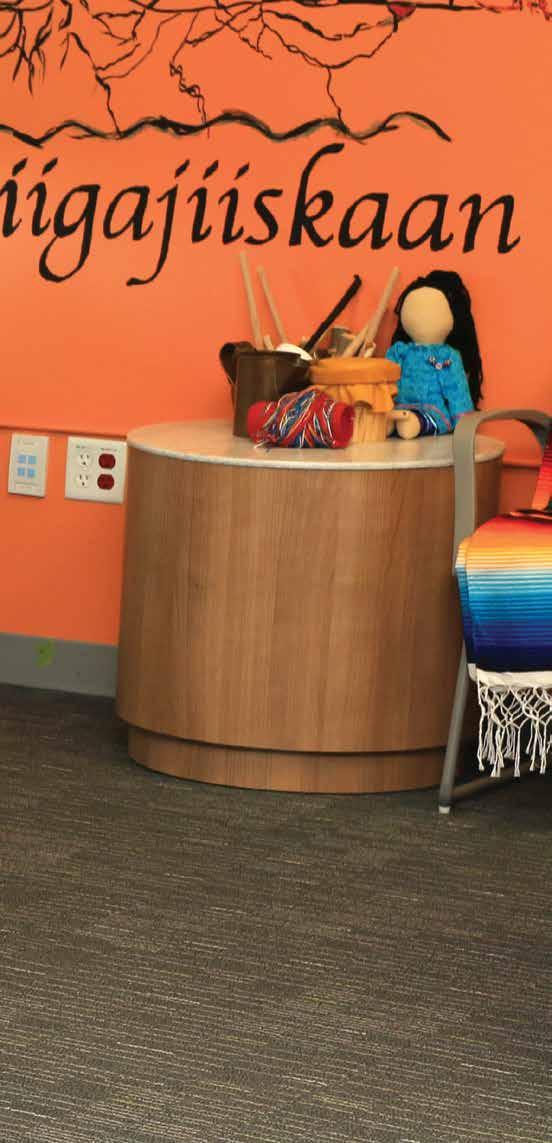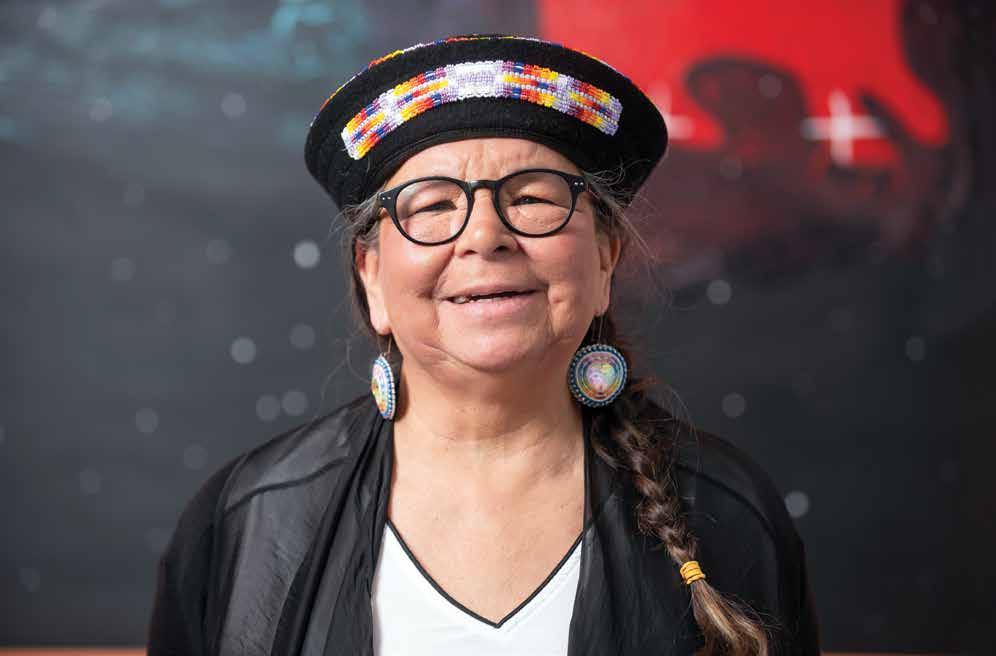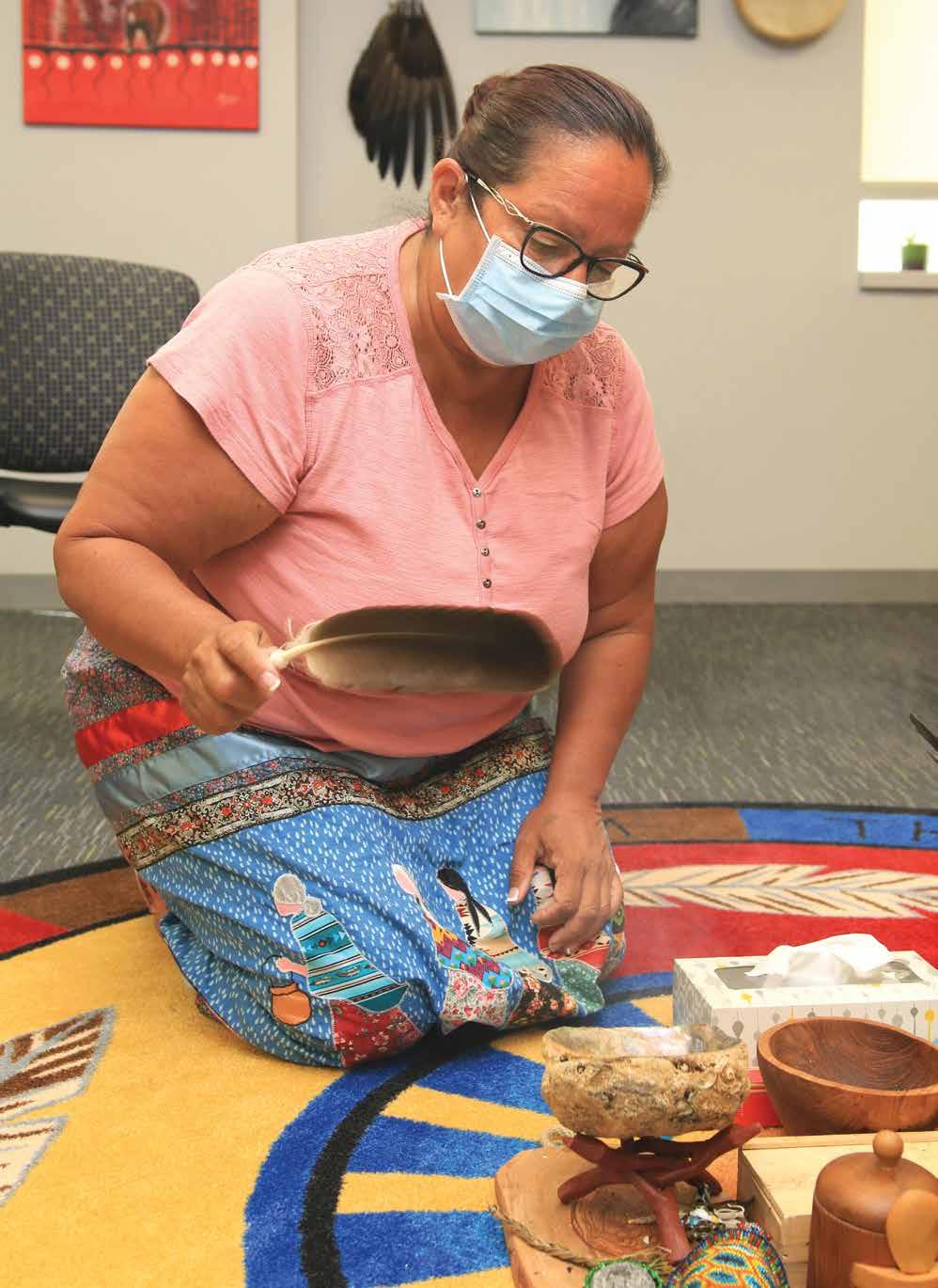
5 minute read
HOPE, HEALING, CONNECTION AND WELLNESS
Biigajiiskaan combinestraditionalhealingmedicinesandceremonies, suchas smudging, drumming and song, withwestern psychiatrictreatmentmodalities.
An innovative, collaborative program of St. Joseph’s Health Care London and Atlohsa Family Healing Services is transforming the mental health care experience of Indigenous peoples.
In nature, a tree stump that is broken begins the vital process of providing essential nutrients for the growth of new life. It’s one small way living things work together in harmony for the greater good.
The importance of doing just that is the concept of a momentous new program offered through St. Joseph’s Health Care London and Atlohsa Family Healing Services (Atlohsa). Called Biigajiiskaan (BEE-GAWJEES-GAWN): Indigenous Pathways to Mental Wellness, this innovative, collaborative program aims to break down long-standing barriers to care faced by Indigenous peoples and transform their mental health care experience.
Indigenous peoples have experienced institutional trauma throughout the history of colonization, including within Canada’s residential school system and racially segregated “Indian hospitals.” “We know that the rate of mental illness and addictions among Indigenous people is more than double that of non-Indigenous individuals in Canada.”
These experiences have led to the loss of language, culture, sense of safety and community. Still today, Indigenous community members continue to experience systemic racism and discrimination in institutions and many are reluctant to go to hospital or access help from health care agencies.
“We know that the rate of mental illness and addictions among Indigenous people is more than double that of non-Indigenous individuals in Canada,” says Jodi Younger, Vice President of Patient Care and Quality at
The name Biigajiiskaan (bee-gaw-jees-gawn) is an Ojibway concept that describes how a broken and rotting tree stump feeds new life. It acknowledges the importance of all living things working together in harmony for the greater good.

St. Joseph’s. “And suicide rates among Indigenous youths are five times higher. There is clearly an urgent need for culturally safe, traditional healing programs as an integral part of care.”
CULTURALLY SAFE
Co-delivered by St. Joseph’s, in partnership with Atlohsa, Biigajiiskaan is a referral-based mental wellness program designed to provide accessible, culturally safe, specialized care for Indigenous people with serious mental illness, addictions and concurrent disorders.
“Due to colonization and systemic racism over many generations, First Nations people have been disconnected from the essence of who they are,” explains Liz Akiwenzie, Biigajiiskaan’s wellness knowledge keeper and cultural educator. “There is so much missing within the medical system for Indigenous individuals. People don’t fully understand the historical impact – the depth of the damage caused by all of the trauma and abuse, the loss of identity, the disruption of families. The intent is to help them heal and get them re-connected to the essence of who they are.”
Based at St. Joseph’s Parkwood Institute, Biigajiiskaan combines traditional healing medicine, Indigenous elder-guided care and ceremony with hospitalbased health care practices and psychiatric treatment.
“We help them to understand – mentally, emotionally, physically and spiritually – how they are put together, that they are connected to themselves, to the creator, to family, to community and to nation,” adds Liz. “In the Indigenous world view, everything is about heart, mind, body and spirit – we are all interconnected.”
MOBILIZING KNOWLEDGE
Raymond Deleary, Executive Director of Atlohsa, explains that Biigajiiskaan is about creating a new Indigenous wellness model of care that transforms health care and mobilizes knowledge to other interested communities, organizations and institutions. “Through this partnership with St. Joseph’s, to the best of our ability, we are attempting to embody the true spirit and intent of the treaties and historical relationships that were originally intended to form a brotherhood and sisterhood between our Indigenous nations and the settler nations,” says Raymond.
Biigajiiskaan is guided by the Thunderbird Partnership Foundation’s First Nations Mental Wellness Continuum Framework. The goal is to provide a hostilefree environment, services that are culturally-safe and Indigenousled, with a focus on meeting the individual, cultural and health care needs of each client.
“Through this framework, wellness can be defined by achieving a healthy level of hope, belonging, meaning and purpose. That is what we are looking to inspire among our people,” says Raymond. “All too often, Indigenous people do not see themselves reflected in the majority of society. Being able to create a mutual space, in partnership with St. Joseph’s, where Indigenous individuals are free to be themselves and experience care and services that are being led by their own community, creates a sense of hope.”
...continued

Various services are available to Indigenous inpatients, outpatients and community outreach clients of St. Joseph’s Mental Health Care Program, or by referral through Atlohsa to the Indigenous population in the LondonMiddlesex and St. Thomas-Elgin County regions. They include:
An Indigenous-led mobile outreach team working inhospital and in the community, providing consultation, assessment, treatment planning/management, discharge planning and ambulatory services.
A dedicated Indigenous healing space at Parkwood Institute’s Mental Health Care Building

Indigenous elder-guided care and teachings from knowledge keepers.
Traditional Indigenous practices, such as healing circles, ceremony, smudging and drumming circles.
Educational and mentoring opportunities for health care professionals and students.

A healing ceremony takes place in the dedicated Indigenous healing space located at St. Joseph’s Parkwood Institute in the Mental Health Care Building.
Belinda Rogers-King is an Indigenous outpatient of St. Joseph’s Mental Health Care Program who was engaged in the early stages of the program’s development and provided input into the design of services. The program, she believes, is long overdue.
“Until you actually face discrimination because of your race, you can’t fully understand it,” says Belinda. “It’s important to have elder guidance from someone who understands the history to teach us where we came from and what has molded us, someone who has walked in our shoes because we are all survivors, not victims.”
1
For more information, visit
www.sjhc.london. on.ca/areas-of-care/ mental-health-care/ biigajiiakaan-indigenousmental-wellness






